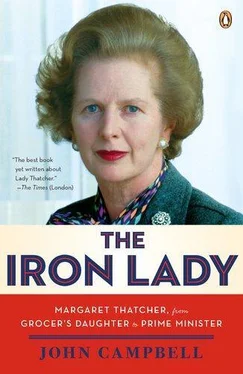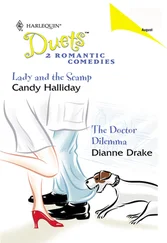Mark and Carol were not exactly spoiled, but they were certainly indulged. They did not lack for clothes or expensive toys: their childhood was very different from the constricted existence Margaret had endured in Grantham. They had family holidays – traditional English seaside holidays, first at Bognor, then on the Isle of Wight where they rented the same house for six years running from 1959. But Carol notes bleakly: ‘Family holidays didn’t appeal to Denis or Margaret.’ 20More adventurously they also went skiing as a family every Christmas from 1962 – quite an unusual thing to do in the early sixties. Carol describes her mother as ‘a cautious skier’ who worked hard on perfecting her technique but eschewed speed: ‘she had no intention of returning with a leg in plaster’. 21
‘When I look back’, Carol goes on, ‘I have no doubt that my mother’s political ambitions – and the single-mindedness with which she pursued them – eclipsed our family and social life.’ She does not blame Margaret. ‘No woman gets to the top by going on family picnics and cooking roast beef and Yorkshire pudding for Sunday lunch with friends.’ 22As a working woman bringing a second full-time income into an already prosperous home (and then spending a good deal of it on child care and private school fees) Mrs Thatcher was blazing a trail which became commonplace in her daughter’s generation. Moreover she was not just working for her own fulfilment, or for money: she had a mission, and ultimately she achieved it. Plenty of prominent men – political leaders, businessmen and artists – have followed their calling at the expense of their families. History will not blame Margaret Thatcher for having done the same. But she deceived herself if she believed her family did not suffer for her single-mindedness.
Seeking a winnable constituency
Margaret Thatcher’s legal career was brief and undistinguished, but nevertheless an important stage in her political apprenticeship. Less than six years elapsed between her being called to the Bar in January 1954 and her entering the House of Commons in October 1959. For those six years, however, her commitment to the law was characteristically thorough and purposeful, and it achieved its purpose. She had recognised even before she went to Oxford that law would be a much better profession than chemistry from which to launch into politics, first as a means of gaining practical experience of legislation in action, and second as a profession whose short terms and flexible hours would allow her both to nurse a constituency – supposing she could find one – and feel that she could always get home in an emergency if required. So it proved.
Women were still conspicuous by their rarity in the Inns of Court: the few exceptions tended to stick to ‘feminine’ specialisms like divorce and family law, rather than challenge hard masculine preserves like tax. Undoubtedly Mrs Thatcher did meet some prejudice at the Bar. Wherever she did encounter male chauvinism, her technique was simply to ignore it while giving it nothing to feed on. She worked at least as hard as any man. She arrived promptly in the morning, wasted no time on gossiping or long lunches, went home at 5.30 and usually took work with her. As a woman she was different because she did not mix socially with other barristers and pupils: she did not go to the pub at the end of the day. But she pulled her weight professionally: she relished showing the men that she expected no concessions. If anything, Patrick Jenkin remembers, her reputation with her peers was the more formidable because they knew that she had passed her exams while nursing twins, and that she went home every evening to look after her husband and children. 23
She was not a brilliant lawyer. In the two years she practised under her own name she impressed everyone who worked with her as highly competent, thorough and meticulous; but as soon as she got into Parliament she was happy to give it up. ‘You can do two things,’ she explained to Miriam Stoppard in 1985.‘You cannot do three things.’ 24The law, like chemistry, was part of her apprenticeship: its discipline shaped her mental equipment, but she never joined the legal tribe. She retained an elevated, almost mystical, reverence for the rule of law as the foundation of English liberty. But she had seen enough of the profession from the inside not to be in awe of its pretensions. As Prime Minister she treated lawyers as just another professional conspiracy to be brought to heel in the public interest; appeals to her professional solidarity fell on deaf ears. Her experience between 1953 and 1959 valuably inoculated her against the claims of legal protectionism.
In 1957, when the twins were three, Mrs Thatcher began again actively seeking a winnable constituency. Despite her record at Dartford and glowing references from Central Office, she did not find it easy. Conservative Associations, frequently dominated by women, are notoriously reluctant, even today, to select women candidates; that they were reluctant in the mid-1950s to adopt a young mother of twins is scarcely surprising. In truth it is more remarkable that she did, at only the fourth attempt, manage to persuade a safe London constituency that she could handle the double burden.
Before that she was shortlisted for two Kentish seats and one in Hertfordshire. The next safe seat where the sitting Member announced his intention to stand down was Finchley, a prosperous slice of north-west London which eventually turned out to be ideal for her. But here again she had a struggle initially against powerful prejudice. She was helped by the fact that the local Association was in bad shape. Despite a comfortable Conservative majority of nearly 13,000 in 1955, the Liberals had been making a big effort – specifically targeting the large Jewish vote – and had captured several council seats.
Sir John Crowder announced that he was stepping down in March 1958. By 15 May Central Office had sent the Association the names of some eighty hopefuls to consider. In June this long list was reduced to twenty, including Margaret Thatcher. Then the seventeen members of the selection committee voted for a shortlist of three: Mrs Thatcher was on everyone’s list, coming top with seventeen votes. ‘It will be interesting’, the deputy area agent minuted, ‘to see whether the 100 per cent vote for Mrs Thatcher contained some people who were willing merely to include one woman in the list of four, but there is no doubt that she completely outshone everyone we interviewed.’ 25
The selection was a close-run thing, but on the second ballot Mrs Thatcher squeezed home by 46 votes to 43. She had won the vote, but she had still to win the acceptance of the whole Association. ‘Woman Chosen as Conservative Prospective Candidate’, the Finchley Press reported. ‘Barrister, Housewife, Mother of Twins.’ 26The London Evening Standard featured the same angle. ‘Tories Choose Beauty’ ran its headline. 27Her sex remained a contentious issue. Sir John Crowder made no secret of his disgust at being succeeded by a woman; and Central Office feared trouble at the formal adoption meeting on 31 July. In the event she had a triumph:
We had anticipated that there might have been some volume of opposition to Mrs Thatcher as a clique in the constituency were known to be opposed to a woman candidate. In fact the Chairman handled the meeting extremely well and Mrs Thatcher gave a most excellent speech and altogether went down splendidly. When the resolution proposing her adoption was put, it was carried with about five descensions [ sic ] who looked extremely red-faced and stupid. 28
Over the next fifteen months she threw herself into the task of getting to know the constituency with her usual thoroughness, holding meetings in each of the ward branches, leading canvassing parties and conducting ‘an intensive campaign to meet as many of the electors as possible’. 29Her pace was perhaps not quite so hectic as it had been in Dartford nine years earlier. There she had been a single woman with no obligations outside her work; now she was married with children and a home to run. Moreover, though she took nothing for granted, Finchley was in fact a safe seat. She had not the urgent sense of being a missionary in enemy territory; she was among friends – once she had overcome initial reservations – securing her base for a long parliamentary career. For that purpose Finchley suited her admirably. The only drawback was that she had just gone to live in Kent, and the constituency was the wrong side of London.
Читать дальше












